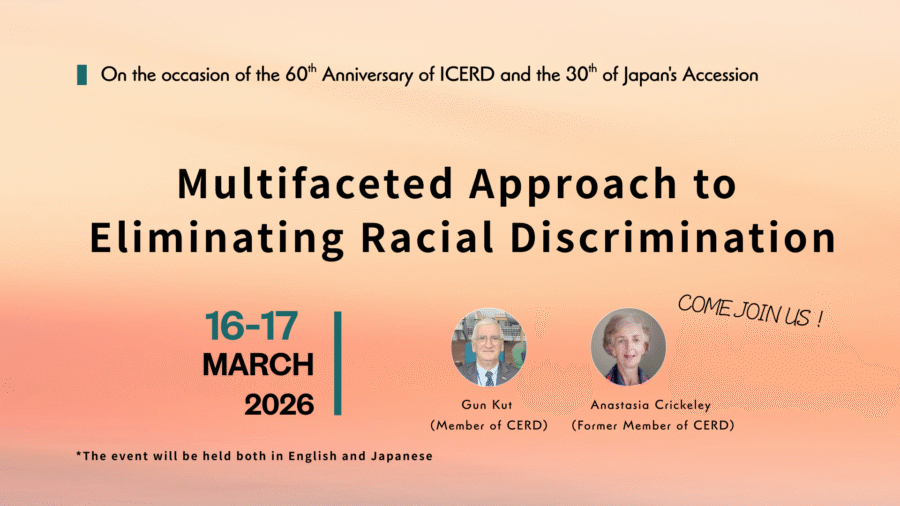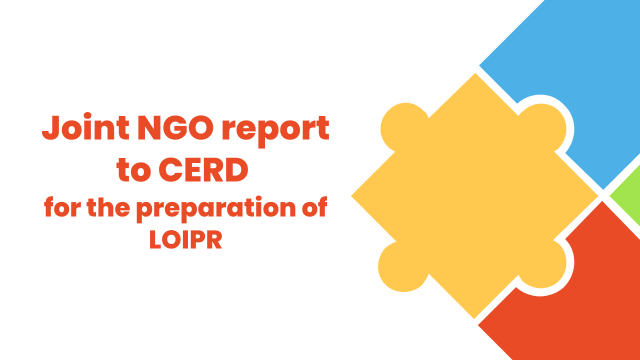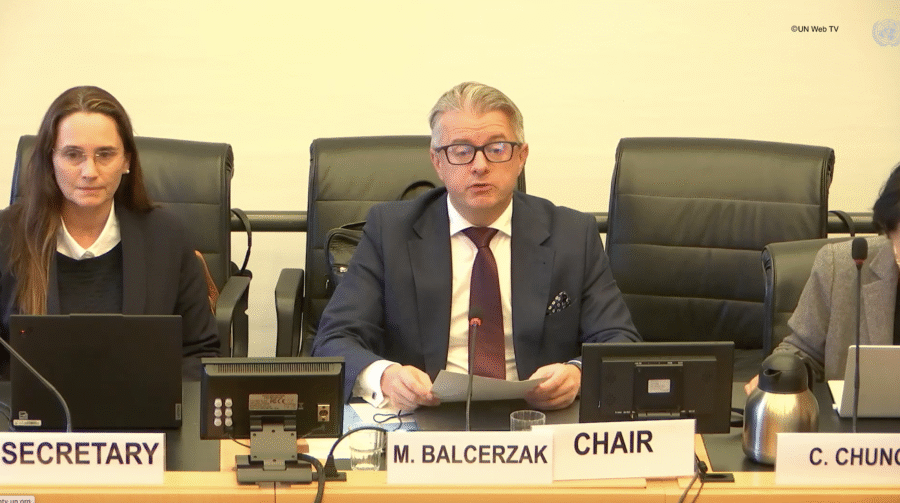TB-Net Statement: Informal Meeting of Chairs of the Human Rights Treaty Bodies (2020)
June 2, 2020
TB-Net Statement
Informal Meeting of Chairs of the Human Rights Treaty Bodies
2-5 June, 2020
- Introduction
This is a joint statement on behalf of seven organizations, which form TB-Net (NGO Network on UN Treaty Bodies)[1]. Created in February 2017, TB-Net is an informal group of international NGOs and networks who work closely with 7 of the UN treaty bodies (CERD, CCPR, CESCR, CEDAW, CAT, CRC, CRPD) and have specialised expertise on their procedures and substantive work. Our mission is to support and enhance the effectiveness of the treaty bodies so that they can better contribute to the realisation of the human rights of all persons.
The COVID-19 pandemic is spotlighting many of the underlying human rights issues and, in many instances, it is exacerbating violations of a wide-range of human rights, discrimination against marginalised groups, and structural inequality. In the current context where states of emergencies are declared and rights are derogated in a large number of countries, the importance of accountability for human rights violations cannot be stressed enough. As the UN Secretary General António Guterres has stated in his policy brief, “this is a time when, more than ever, governments need to be open and transparent, responsive and accountable to the people they are seeking to protect”.[2]
- Treaty Bodies’ work in relation to COVID-19
As a key part of the international human rights system, the UN Treaty Bodies (UNTBs) will play an essential role in reviewing States’ responses to COVID-19, adding their guidance to that provided by the UN Secretariat, agencies and bodies. The UNTBs will also be instrumental to highlight good practices in preparing and responding to such crises and prevent further human rights violations. We urge the UNTBs to remind States of their human rights obligations and to strengthen their cooperation with the UNTBs including by supporting them to carry out their mandates despite technical and logistical challenges posed by the pandemic.
TB-Net welcomes the Chairpersons’ discussions on coordinated substantive work in relation to COVID-19 and looks forward to contributing to this with technical inputs and to creating synergies with the monitoring and reporting work of civil society. In order to assess rights-restricting measures adopted in response to the pandemic, we recommend each UNTB to incorporate specific questions in Lists of Issues (LOIs) and Lists of Issues Prior to Reporting (LOIPRs) in coordination with other Committees. For States parties who have already submitted their reports prior to the pandemic, we recommend the UNTBs to publish Lists of Themes (LOTs) with questions specific to COVID-19 to allow for a punctual, up-to-date dialogue with States delegations.
We welcome the UN Secretary-General’s decision to allow the newly elected members to make the solemn declaration in writing.[3] However, we are concerned by the delay in appointing Committee positions, including new Chairs, due to the postponement of the first sessions of the year. TB-Net urges the UNTBs to swiftly proceed with the appointment of Committee positions in writing.
With regard to the Chairpersons’ discussion on working methods and tools in relation to COVID-19, TB-Net has developed a specific and more detailed paper to inform the Chairpersons’ reflection. The paper suggests:
- general principles regarding online work for the UNTBs;
- requirements for all online meetings; and
- considerations on specific areas of work of the UNTBs (including individual communications, State reporting, General Comments and Days of Discussion).
Most importantly, the paper draws key conclusions and recommendations for the Chairpersons and the UNTBs to take into account.
The pandemic has certainly drawn everyone’s attention to the need to strengthen the capacity of the UNTBs to engage and interact online. If there is a positive outcome of this situation, it could be that the UNTBs members will benefit from a better digital environment in which they can interact among themselves as well as with stakeholders they would not otherwise reach, in a safe and effective manner.
While this has not yet been achieved, it is important to adopt a pragmatic approach, pilot experiences and draw lessons with the ultimate goal of maintaining the quality of the UNTBs’ work as much as possible, and even improving it in the long-term. The impact on the engagement of civil society should be one of the primary considerations of decisions relating to online working methods including safe accessibility requirements. TB-Net could support the UNTBs to assess these decisions by collecting feedback from the CSOs who will experience the new online working methods.
Further, TB-Net recommends that when decisions are taken in relation to any modification of future sessions and on online working methods, the UNTBs ensure that:
- Engagement with civil society is enhanced and not reduced through online working methods and the UNTBs ensure flexibility and inclusivity. Online engagement should complement, and not replace face-to-face meetings with civil society;
- Decisions are immediately and widely communicated;
- Information on any modification of future sessions and online work is shared in a timely manner to allow transparency and predictability of the process;
- Current public meetings remain public and accessible if held online;
- Inter-sessional online work is used for private meetings of Committee members only;
- Dialogues with States parties should not be held online, except in very exceptional circumstances, where in-person meetings are not possible for a prolonged period of time; and
- Days of discussion are kept as in-person meetings with online participation available to enhance engagement.
- 2020 review of the treaty body system
TB-Net welcomes that some Committees have taken steps to develop fixed calendars for their reviews with State parties based on the position paper[4] adopted at the last year’s Chairpersons meeting. We believe that the predictability that is provided by a fixed calendar will strengthen the effectiveness of the UNTB system and be a significant benefit to all stakeholders in navigating it. The current situation stresses the urgent need for such calendars, as disruptions caused by the pandemic are adding challenges in the unpredictability of reviews and potentially further delaying reporting by States parties. We note that the Human Rights Committee has already adopted a calendar based on the predictable review cycle[5], and that the Committee on Economic, Social and Cultural Rights (CESCR) is in the process of developing its fixed calendar. We encourage the UNTBs to adopt a fixed and coordinated calendar for reviews by all Committees. To ensure that such a calendar operates smoothly for all stakeholders, we suggest that the UNTBs provide information about their modalities for scheduling countries.
Last year, together with the International Service for Human Rights and Amnesty International, TB-Net led a series of consultations with CSOs from the national, regional and international levels to develop joint proposals for the 2020 review of the treaty body system. The proposals[6] were prepared in accordance with five overarching principles: human rights protection as the ultimate aim; specificity within one system; adequate funding for the system’s effective functioning; civil society participation as a vital part of the system; and the independence of the UNTBs.
The proposals offer a model in which all States parties report every four years, through an alternating, two-level cycle of comprehensive and focused reviews. The UNTBs would review each State party on a regular basis according to a fixed and coordinated calendar, regardless of whether States parties have submitted their reports. The comprehensive reviews would take place every 8 years for 6 hours in Geneva, and address all the provisions of the respective treaties. The focused reviews or “Technical Review of Implementation Progress (TRIP)”, would also take place 4 years later, focusing on assessing the progress made on the most pressing issues identified in the comprehensive review, as well as any new or urgent issues that have arisen. The focused review would take place for 2-3 hours, in country, at a regional UN office or in Geneva. The proposals also recommend greater coordination among the UNTBs on their substantive work, in particular in relation to General Comments and Concluding Observations/Recommendations. The UNTBs are encouraged to take further steps towards alignment of their working methods and procedures, which would improve the accessibility of the system for all stakeholders, and remove ‘unnecessary’ procedural differences. Constructive dialogues with States parties would also benefit from alignment based on good practices. For accessibility and visibility of the system for rights holders, online live streaming of the UNTB reviews, in English and a language spoken in the concerned State, when available, must remain as default for all UNTB reviews. At the same time, accessibility for different groups, such as persons with disabilities and children, must be ensured.
We believe that the proposals would: ensure regular reporting by States parties; strengthen the effectiveness of the system and implementation of recommendations; and reinforce the notion of one treaty body system that is coherent, coordinated and accessible to rights holders and civil society.
The proposals also recommend the UNTBs to preserve and strengthen the key elements of civil society engagement, including participation via videoconferencing services and confidential submissions. CSOs should be able to provide inputs from the early stage of the procedure (the adoption of LOIPR) and during comprehensive and focused reviews.
[1] TB-Net comprises: Centre for Civil and Political Rights (CCPR Centre); Child Rights Connect; Global Initiative for Economic, Social and Cultural Rights (GI-ESCR); International Disability Alliance (IDA); International Movement Against All Forms of Discrimination and Racism (IMADR); International Women’s Rights Watch Asia Pacific (IWRAW-AP); and World Organisation Against Torture (OMCT).
[2] https://www.un.org/sites/un2.un.org/files/un_policy_brief_on_human_rights_and_covid_23_april_2020.pdf
[3] https://www.ohchr.org/EN/HRBodies/CMW/Pages/Membership.aspx
[4] https://tbinternet.ohchr.org/_layouts/15/treatybodyexternal/Download.aspx?symbolno=INT/CHAIRPERSONS/MCO/31/31309&Lang=en
[5] https://www.ohchr.org/EN/HRBodies/CCPR/Pages/PredictableReviewCycle.aspx
[6] http://ccprcentre.org/files/media/joint_ngo_proposal_on_untb_reviews.pdf
Download the statement and reflections paper ![]()





